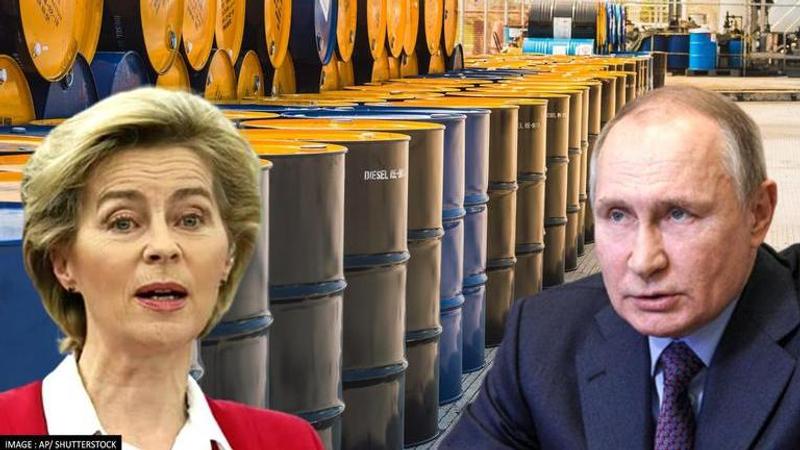Published 09:33 IST, May 5th 2022
Oil prices jump as EU mulls banning Russia oil over Ukraine war
Oil prices on Wednesday have jumped sharply after the European Union (EU) announced a plan to eliminate Russian oil, further causing supply concerns

As the ongoing Russia-Ukraine war has entered its 71st day, Oil prices on Wednesday have jumped sharply after the European Union (EU) announced a plan to eliminate Russian oil, further causing supply concerns. According to an ANI report, on the New York Mercantile Exchange, the West Texas Intermediate (WTI) for June supply gained 5.4 dollars, or 5.3%, to close at 107.81 dollars a barrel. While, on the London ICE Futures Exchange, Brent crude for July shipment rose 5.17 dollars, or 4.9%, to settle at 110.14 dollars per barrel.
This spike in oil prices came after President of the European Commission Ursula von der Leyen suggested a fresh set of sanctions on Russia on May 9, including a total oil embargo on Russian oil imports, with the goal of reducing Europe's energy dependency on Moscow by the end of 2022. Von der Leyen announced on Wednesday that the EU will phase out Russian crude oil supplies in six months and also refined products by the end of this year. The proposal is a part of the sixth round of sanctions imposed on Russia in response to its military intervention in Ukraine.
EU to impose additional sanctions on Russia
Officials from the European Commission have submitted a draft proposal to member states outlining the additional sanctions, which are aimed mostly at Moscow's energy industry and banks, including Sberbank, Russia's largest lender, as per media reports.
According to European officials, the proposed oil embargo would be implemented in phases, and numerous banks that have been blacklisted from the SWIFT messaging system will be included in the additional sanctions package. Further, Josep Borrell, High Representative of the European Union for Foreign Affairs and Security Policy, said in a tweet post on May 3, “We are working on the 6th package of sanctions which aims to de-swift more banks, list disinformation actors and tackle oil imports.”
Meanwhile, following the suspension of oil supplies to Poland and Bulgaria by Russian state-owned oil giant Gazprom, EU member states gathered in the Gas Coordination Group to discuss the next potential steps. The fresh sanctions idea comes after German Vice-Chancellor Robert Habeck informed EU ministers on Monday that "Germany is not against an oil ban on Russia." Berlin, which had expressed doubts about the entire oil embargo on Russia, buys 35% of its crude oil from the country. Other countries, including Hungary and Slovakia, are nearly entirely reliant on Moscow for gasoline, according to media reports, which might make the execution of the impending package difficult.
(Image: AP/ shutterstock)
Updated 09:33 IST, May 5th 2022




